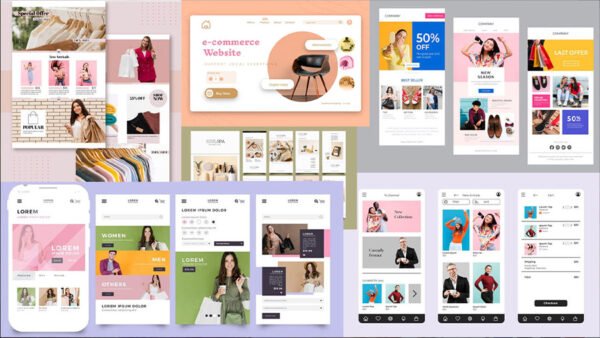Introduction
- Brief overview of the importance of staying updated with e-commerce design trends.
- How trends can impact user experience and conversion rates.
Enhanced Personalization
- Dynamic Content: Customizing content based on user behavior, preferences, and past purchases.
- AI Integration: Using AI to offer personalized recommendations and improve user engagement.
- Example: Showcasing how major e-commerce brands are implementing personalization.
Mobile-First Design
- Responsive Design: Ensuring websites are optimized for mobile devices first.
- Mobile Payment Integration: Enhancing the mobile checkout process with easy payment options like Apple Pay and Google Wallet.
- Example: Highlighting mobile-first design success stories.
Voice Search Optimization
- Voice-Activated Shopping: Integrating voice search capabilities to improve user experience.
- SEO Strategies: Adapting SEO tactics for voice search queries.
- Example: How voice search is influencing e-commerce websites.
Augmented Reality (AR) Integration
- Virtual Try-Ons: Allowing customers to visualize products in their environment before purchase.
- Interactive Features: Using AR to enhance product displays and customer interactions.
- Example: Showcasing brands that effectively use AR technology.
Minimalist Design with Bold Visuals
- Clean Layouts: Emphasizing simplicity and ease of navigation.
- High-Quality Imagery: Using large, bold visuals to capture attention and highlight products.
- Example: Brands that have successfully adopted minimalist design principles.
Sustainability and Ethical Branding
- Eco-Friendly Design: Highlighting sustainable practices and products through website design.
- Transparency: Providing clear information about the brand’s ethical practices.
- Example: E-commerce sites that effectively communicate their sustainability efforts.
Interactive and Immersive Elements
- Gamification: Incorporating interactive elements such as quizzes and games to engage users.
- 360-Degree Views: Offering immersive product experiences with 360-degree views and interactive features.
- Example: Innovative use of interactive elements on e-commerce websites.
Advanced Chatbots and Customer Support
- AI Chatbots: Providing instant support and personalized assistance through advanced chatbots.
- Live Chat Integration: Enhancing customer service with real-time chat options.
- Example: How chatbots are transforming customer support in e-commerce.
Enhanced Security Features
- Data Protection: Implementing advanced security measures to protect user data.
- Trust Signals: Displaying trust badges and secure payment options to reassure customers.
- Example: E-commerce websites with robust security measures.
Social Commerce Integration
- Shoppable Posts: Integrating shopping features directly into social media platforms.
- Influencer Partnerships: Leveraging influencers to drive traffic and sales through social media channels.
- Example: Success stories of social commerce strategies.
Conclusion
- Recap of the top trends and their potential impact on e-commerce websites.
- Encouragement to adopt these trends to stay competitive and enhance user experience.



